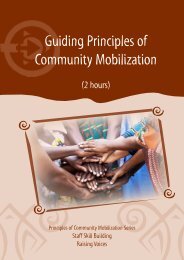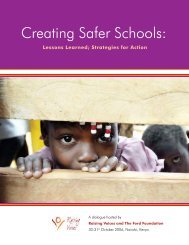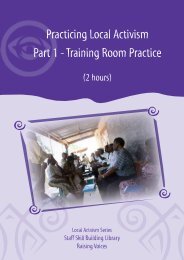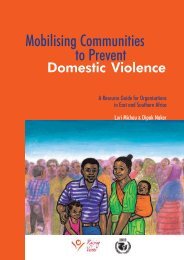Violence against children, the voices of Ugandan ... - Raising Voices
Violence against children, the voices of Ugandan ... - Raising Voices
Violence against children, the voices of Ugandan ... - Raising Voices
Create successful ePaper yourself
Turn your PDF publications into a flip-book with our unique Google optimized e-Paper software.
QUESTION 6Why do you punish <strong>children</strong>?Adults responded to this question with a surprisingamount <strong>of</strong> candour and forthright discussion. Thisquestion elevated <strong>the</strong> discussion from posturingto collective problem solving. Participants shareddeep-seated reasons for punishing <strong>children</strong>, manygoing beyond <strong>the</strong> seemingly right and defensiblereasons within <strong>the</strong>ir community.I punish for many reasons. Sometimes it is toguide <strong>the</strong> child, sometimes because he is gettingin my head, sometimes because I am angry, andsometimes because I don’t know what else todo. Sometimes I do it because <strong>the</strong>re is no oneelse to blame.female, parent, KaseseOf <strong>the</strong> adults consulted in this study, 87.9 percentsaid that <strong>the</strong> goal <strong>of</strong> punishing <strong>children</strong> was toguide <strong>the</strong>m on how to behave. In focus groupdiscussions and interviews, as well as informalFigure 3.15 Adults’ rationale for punishing<strong>children</strong>% <strong>of</strong> respondents100806040conversations, adults highlighted three qualities<strong>the</strong>y were trying to instil in a child throughpunishment: compliance, respect for elders,and allegiance to traditional values espousedby <strong>the</strong> community. To instil <strong>the</strong>se qualities, 91.3percent <strong>of</strong> adults reported using physical oremotional punishment. However, 51.9 percent <strong>of</strong>adults expressed ambivalence when asked if in<strong>the</strong>ir experiences punishing <strong>children</strong> resulted inintended change <strong>of</strong> behaviour. Among teachers,only 32.6 percent actually believed that punishing<strong>children</strong> would change <strong>the</strong>ir behaviour, and 61.2percent said that punishing <strong>children</strong> only changesbehaviour “sometimes.” However, although manyadults acknowledged this contradiction individually,in a group, adults continued to emphasize <strong>the</strong>importance <strong>of</strong> punishment.When adults were asked how <strong>the</strong> punishments <strong>the</strong>yused might achieve <strong>the</strong> stated goals, 72.7 percent<strong>of</strong> <strong>the</strong> adults said that <strong>the</strong>y used punishment toassociate fear with <strong>the</strong> misbehaviour, and 43.3percent said <strong>the</strong>y used punishment to shame<strong>children</strong>. Many adults agreed that nei<strong>the</strong>r fearnor shame helped <strong>children</strong> understand how <strong>the</strong>yhad misbehaved yet when asked what punishingdemonstrated, 80.7 percent <strong>of</strong> adults said thatpunishing showed you cared about <strong>children</strong>, and75 percent said that punishing showed you were agood parent or teacher.200Scare <strong>the</strong>m sothat <strong>the</strong>y fearrepeating <strong>the</strong>mistakeShame <strong>the</strong>m so<strong>the</strong>y will notrepeat <strong>the</strong>mistakeGuide <strong>the</strong>mon howto behaveTeach <strong>the</strong>mto showrespect foreldersO<strong>the</strong>r80 Part Three Adults’ Rationale
















